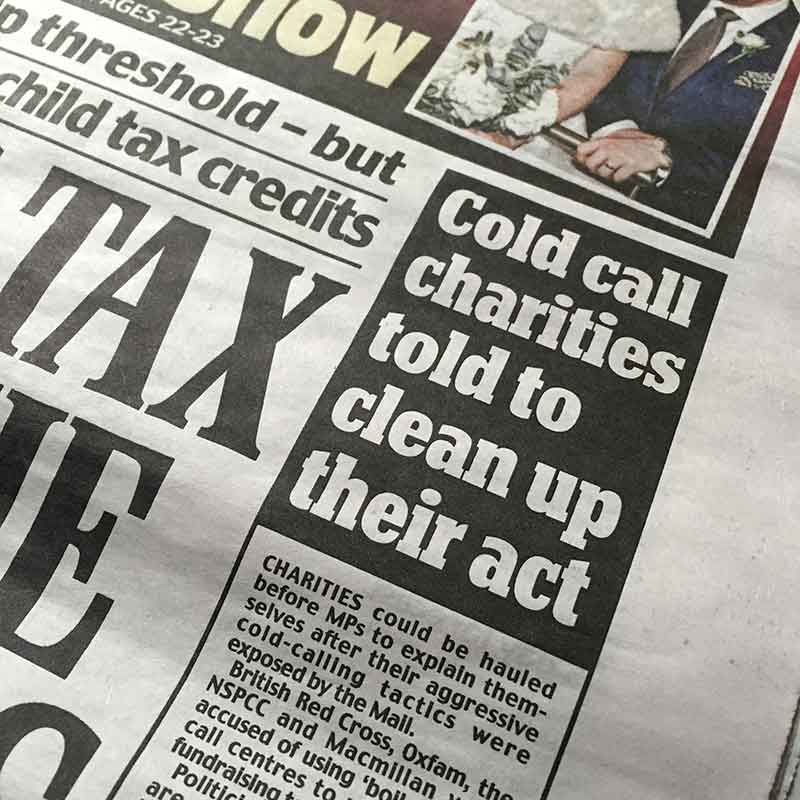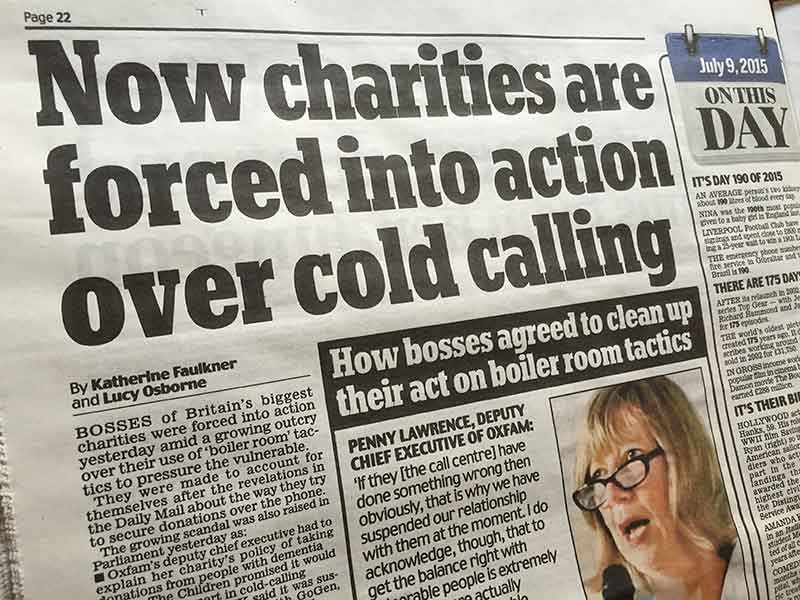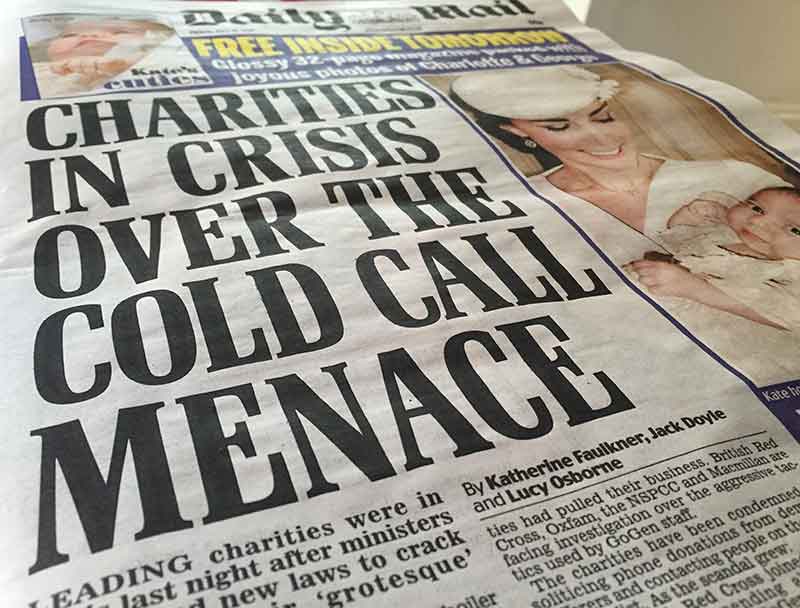The Daily Mail criticises fundraising methods for five days running
This week The Daily Mail has returned to its criticism of some fundraising methods, and with vim. The newspaper has published findings from its investigation into the work of a telephone fundraising company and some of the charities that use its services. It is also demanding changes to fundraising methods.
The investigative focus on the charity fundraising sector follows The Mail on Sunday’s coverage of the death of Olive Cooke in May 2015 in which it claimed that she had been “hounded to death” by charity fundraisers due to the volume of fundraising direct mail and telephone appeals she had received.
The coverage had led to governmental demands that the charity sector reform its methods and improve its self-regulation.
1. 7 July: “charity cold call sharks”

Shamed: charity cold call sharks – front page of The Daily Mail on 7 July 2015
The first salvo claimed that “Britain’s biggest charities ruthlessly hound vulnerable for cash – even if they try to opt out of receiving calls”.
Over three pages the newspaper criticised The British Red Cross, NSPCC, Oxfam and Macmillan for “making calls to households registered with the Telephone Preference Service”.
Vulnerable people
In particular it claimed that campaigns run by these charities were including vulnerable people. The Mail reported that “donors who reveal they have dementia are still being asked to commit to direct debits”.
It linked the investigation with its earlier claims about Olive Cooke, saying:
Advertisement
“Charities were already in the spotlight following an outcry over the death of 92-year-old Olive Cooke, who had been swamped by fundraising appeals”.
The Daily Mail sought a comment from Rob Wilson, the Minister for Civil Society, so that it could include it in the publication. He said that the behaviour reported by the Mail was “immoral”.
A three-week undercover investigation focused on the alleged practices of some staff at London-based telephone fundraising agency GoGen, which conducts fundraising campaigns for 40 charities. The newspaper published video that it said featured staff being trained at GoGen.
The Mail received thanks for its investigation from Stephen Eckersley, head of enforcement at the Information Commissioner’s Office, and Bernard Jenkin MP, Conservative chairman of the Commons public administration committee. Richard Lloyd of consumer group Which? responded by asking for the government to launch a full review of fundraising rules and regulations.
The FRSB told The Mail that it was “very concerned” and would look into the allegations urgently.
Responses from the charities
All four charities denied acting unlawfully, and Oxfam immediately suspended all telephone fundraising in the UK. All the charities said they would investigate the claims.
Two members of staff at GoGen were suspended while the firm looked into the Daily Mail’s evidence.
In the newspaper’s op ed ‘Comment’ (p. 16) the newspaper asked:
“How much longer must the vulnerable be left to suffer before the law on cold-calling is rewritten to spell out that No means No?”
2. 8 July: “cold call charities told to clean up their act”
The second day of revelations and accusations from the Daily Mail Investigations Unit also received front page coverage. The newspaper reported that “charities could be hauled before MPs to explain their aggressive cold-calling tactics were exposed by the Mail”.
‘Boiler room’
It used the phrase “boiler room” to describe the call centres and the techniques used by charities for their fundraising. Information Commissioner Christopher Graham also used the phrase, talking of ‘boiler room operations’.
It focused further on the fundraising phone calls that it said were being made to vulnerable people, specifically those suffering from dementia.

The Mail claimed that confusion over regulating fundraising was “caused by the fact that there are four bodies regulating the sector”, namely the Institute of Fundraising, the Fundraising Standards Board, the Charity Commission and the Information Commissioner’s Office.
Labour MP Paul Flynn, a member of the Public Administration and Constitutional Affairs Committee, said that charities had risked their good name by falling for “explotative” fundraising techniques. He added:
“They fall for the easy money that comes from chuggers and direct phone calls”.
Naming (and shaming?) Fundraising Directors

The Daily Mail gets personal in its criticisms of four charities.
The Daily Mail named and printed photographs of the Directors of Fundraising at the four national charities it had named the day before. It didn’t feature details of the charities’ CEOs or their chair of trustees.
So, James Phillips, Tim Hunter, Paul Farthing and Mark Astarita were all profiled, with the sub-headings “I’m a professional beggar”, “Mr 10% Growth”, “The Mass Mailing Expert”, and “The Career Fundraiser”.
The location of their homes was included (with its market value), the name of their partner and their age (where available), plus their salary (where published), and in one case, the current reported state of their marriage. Three of the charities publish their senior staff’s salaries, but Oxfam told the Mail that it does not release personal salary details.
They added personal details gleaned from social media such as apologies by one to his mother for indiscretions when younger, and a reference to images that show that another had drinks at a party and engaged in “larking about at a festival”.
Reader responses
The Daily Mail printed seven sample responses from the “huge outcry among readers who say they are bombarded with calls from charities”.
3. 9 July: “now charities are forced into action over cold calling”
The investigation disappeared from the front page, not surprisingly given The Daily Mail’s coverage of the government’s Budget.
On page 22, however, the Investigations Unit reported on the impact of the previous two days’ stories. It noted the four charities’ responses to the accusations and how they had “agreed to clean up their act on boiler room tactics”. It didn’t make clear whether the charities agreed with that definition of their fundraising agency’s business methods.
It mentioned that the charities had already contacted their supporters to explain their organisation’s position with regard to the accusations, and what it was doing to investigate the issue. It quoted Penny Lawrence, Deputy Chief Executive of Oxfam; Justin Forsyth, Save the Children CEO, and Harpal Kumar, Cancer Research UK CEO.
The newspaper reported how the issue had been raised in Parliament the day before, with questions being asked of International Development Secretary Justine Greening MP over their behaviour.
The Mail contrasted the reactions of the charities. It quoted Oxfam’s deputy chief executive Penny Lawrence whom it said “admitted the policy of taking donations from those with dementia – as long as the person could answer a few basic questions – had been approved by the charity”. In contrast, it noted that “Save the Children chief executive Justin Forsyth said the charity had made the decision to end cold-calling”. It did acknowledge that the charity had been working on this move for several months prior to the newspaper’s latest investigation.
4. 10 July: “charities in crisis over the cold call menace”
The story now returned to the front page of The Daily Mail, balanced by a promotion of the next day’s 32-page magazine featuring photographs of Princess Charlotte and Prince George.
The reporters Katherine Faulkner, Jack Doyle and Lucy Osborne now reported that “leading charities were in crisis last night after ministers threatened new laws to crack down on their ‘grotesque’ fundraising practices”.
Chris Grayling MP, Leader of the House of Commons, had told charity leaders that they “should be ashamed of their shocking practices exposed by an undercover Daily Mail investigation”. He warned that the government “would legislate if the charities did not ‘get their house in order’ immediately”.
GoGen was reported to have closed down three of its four call centres because charities had stopped doing business with them.
The reporters found that GoGen had been the subject of a Fundraising Standards Board investigation last year over “pressuring people with dementia”. They criticised charities for continuing to do business with GoGen. Guiseppe Iantosca of GoGen confirmed to the Mail that his staff had been re-trained following the adjudication.
‘There’s only one way to stop charity call centre sharks – ban them!’
The Daily Mail also carried a one-page article by Marjorie Wallace, founder of mental health charity SANE, under the above headline. She pointed out that over nearly 30 years her charity had raised more than £30 million, “but we have always tried to do it with integrity and honesty”.
She believed that anyone fundraising for her charity must be “part of the charity”. She wouldn’t want “someone parroting a script – there is no way what they read off a screen can reflect the genuine work of our organisation”.
She joined the call for new legislation to tackle what they Daily Mail alleged. In fact she wanted two fundraising methods banned entirely.
“I believe cold-calling individuals by phone, and fundraising face to face on the street – by so-called chuggers – or on doorsteps, should be banned”.
She also called for a review, but it was not clear whether that would come before or after the banning.
She did put the investigation into some context, noting “the majority of charities – even the ones exposed this week by the Mail – are helping people who might otherwise not be helped”.
5. 11 July: “Victory!”
The Daily Mail declared victory on its front page as the Prime Minister confirmed that he would act against the “unacceptable practices” by introducing a new law “to curb the shameful tactics of charity fundraisers”. There was no qualification of “some charity fundraisers”, simply “charity fundraisers”, presumably meaning all charity fundraisers.
The new measures would be introduced in Parliament in the next few days, meaning that the Daily Mail’s investigation had resulted in a change in the law in just under one week.
The new rules would require charities with a turnover of over £1 million “to document how they are monitoring their fundraisers to ensure they are not exploiting potential donors”.
Further legislation was threatened, depending on the findings of a fundraising sector-wide review to be chaired by NCVO’s CEO Stuart Etherington. He told the Mail that its investigation “has raised concerns that have shaken charities to the core”. He added “we should be inspired by charities, not frightened of them”.
Both the Prime Minister and Minister for Civil Society explicitly thanked the Daily Mail for its role in uncovering these practices at GoGen.
The latter referred back to coverage of the death of charity volunteer Mrs Olive Cooke, and the Daily Mail’s attempts to link it to the volume of charity fundraising appeals she received. He told the Mail:
“After the tragic death of Olive Cooke, I made clear that the behaviour of charities had to change or we would take action – today I am delivering on that promise”.
‘How brutal cold call tactics were exposed’
In a final one-page article, Katherine Faulkner summed up the progress of the investigation over the past week, with the headlines it produced.

A week in headlines: The Daily Mail’s investigation and campaign, digested
It included a quote from Dame Hilary Blume, chief executive of the Charities Advisory Trust. She said:
“I’d like to dismiss all the people who are incharge of these big fundraising operations in these big charities. I’d say to them, go and develop your careers elsewhere. We want people who have a higher ethical standard”.
Infamous phrases
The reports and campaign by the Daily Mail has now introduced a number of epithets which will no doubt be referred back to by some when referring to the fundraising profession.
• “The call centre sweatshop” (7 July 2015, pp.4-5)
• ‘Boiler room operations” – Information Commissioner Christopher Graham (8 July 2015, p.6)
• ‘Hot house conditions and Wall Street tactics’ – Michael Ellis MP (8 July 2015, p.7)
• ‘We should be inspired by charities, not frightened of them’ Stuart Etherington, 11 July 2015, p.4
• ‘Rogue fundraisers’ Oxfam spokesman, 11 July 2015, p.4










